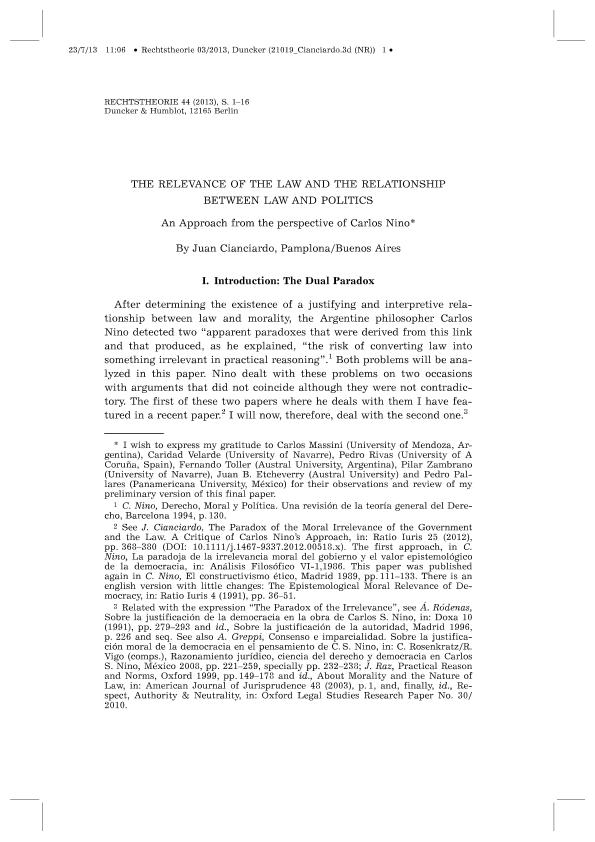Mostrar el registro sencillo del ítem
dc.contributor.author
Cianciardo, Juan Carlos Mariano

dc.date.available
2017-01-30T20:10:35Z
dc.date.issued
2014-03
dc.identifier.citation
Cianciardo, Juan Carlos Mariano; The relevance of the law and the relationship between Law and Politic: an approach from the perspective of Carlos Nino; Dunken & Humblot; Rechtstheorie; 45; 1; 3-2014; 19-34
dc.identifier.issn
0034-1398
dc.identifier.uri
http://hdl.handle.net/11336/12195
dc.description.abstract
After determining the existence of a justifying and interpretive relationship between law and morality, the Argentine philosopher Carlos Nino detected two apparent paradoxes that were derived from this link and that produced, as he explained, the risk of converting law into something irrelevant in practical reasoning. Both problems will be analyzed in this paper. The first paradox is that of the superfluous nature of law which Nino chooses to describe in these words: "If we must inevitably demonstrate that a legal regulation is founded on moral principles conceived as valid, why can we not also find the justification of that action or decision based directly on those same principles? Why is a government, with its laws, necessary when these same laws do not allow for the justification of an action or decision by appealing to moral principles?". The second paradox also consists of a questioning of the importance of government and its laws. This has to do with a paradox caused by the "extreme indecisiveness" of law. Nino explains that if all the evaluative steps of interpretation are abstracted, the only "solid piece of information" that could condition the interpretive process consists of texts and behaviors, that is to say, graphics and body movement. if law possesses a justifiable relationship with morality then it is superfluous; and if it possesses an interpretive relationship, then it is irrelevant. The first of the paradoxes arises in the area of regulations and in the second one in the interpretation of these. It is actually a question of two manners of approaching the same problem or of two ways of questioning the contributions made by law to practical reasoning. Nino asserts that the existence of the aforementioned dual relationship (justifiable and interpretive) should resolve one or the other of the difficulties. It should ultimately attempt to provide support for the practical differentiating factor that law provides to morality. In its second approximation to the problem, which I will deal with in this paper, this Argentine author maintains that the solution lies in the acceptance of the existence of a direct relationship between law and politics.
dc.format
application/pdf
dc.language.iso
eng
dc.publisher
Dunken & Humblot
dc.rights
info:eu-repo/semantics/openAccess
dc.rights.uri
https://creativecommons.org/licenses/by-nc-sa/2.5/ar/
dc.subject
Relevance Of the Law
dc.subject
Human Rights
dc.subject
Paradox Of the Relevance
dc.subject
Law And Moral
dc.subject.classification
Otras Derecho

dc.subject.classification
Derecho

dc.subject.classification
CIENCIAS SOCIALES

dc.title
The relevance of the law and the relationship between Law and Politic: an approach from the perspective of Carlos Nino
dc.type
info:eu-repo/semantics/article
dc.type
info:ar-repo/semantics/artículo
dc.type
info:eu-repo/semantics/publishedVersion
dc.date.updated
2017-01-27T13:28:10Z
dc.identifier.eissn
1865-519X
dc.journal.volume
45
dc.journal.number
1
dc.journal.pagination
19-34
dc.journal.pais
Alemania

dc.journal.ciudad
Berlín
dc.description.fil
Fil: Cianciardo, Juan Carlos Mariano. Consejo Nacional de Investigaciones Científicas y Técnicas; Argentina
dc.journal.title
Rechtstheorie
dc.relation.alternativeid
info:eu-repo/semantics/altIdentifier/url/http://ejournals.duncker-humblot.de/doi/abs/10.3790/rth.45.1.19
dc.relation.alternativeid
info:eu-repo/semantics/altIdentifier/doi/http://dx.doi.org/10.3790/rth.45.1.19
Archivos asociados
